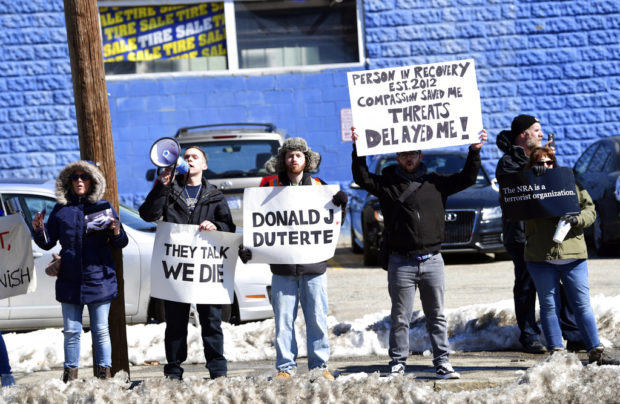Trump adopts Duterte stance in drug war

Protesters gather near the Manchester Central Fire Station in Manchester, N.H., Monday, March 19, 2018, where President Donald Trump madee an unscheduled visit. Trump is in New Hampshire to unveil more of his plan to combat the nation’s opioid crisis. (AP Photo/Susan Walsh)
MANCHESTER, New Hampshire — Embracing the tough penalties favored by global strongmen, US President Donald Trump on Monday brandished the death penalty as a fitting punishment for drug traffickers fueling the opioid epidemic.
The scourge has torn through the rural and working-class communities that in large numbers voted for Trump.
And the president, though he has come under criticism for being slow to unveil his plan, has seized on harsh sentences as key to stopping the plague.
“Toughness is the thing that they most fear,” Trump said.
‘Donald J. Duterte’
Article continues after this advertisementTrump has long spoken approvingly about countries like Singapore that harshly punish dealers.
Article continues after this advertisementDuring a trip to Asia last fall, he did not publicly rebuke the Philippines’ President Duterte, whose war on drugs has led to alleged extrajudicial killings of suspected traffickers.
Outside a local firehouse that Trump visited before Monday’s speech, someone compared the two leaders with a sign that said: “Donald J. Duterte.”
Trump made his announcement in New Hampshire, a state hit hard by opioids and an early marker for the reelection campaign he has already announced.
He called for broadening education and awareness about drug addiction while expanding access to proven treatment and recovery efforts.
But the backbone of his plan is to toughen punishments for those caught trafficking highly addictive drugs.
Death for traffickers
“This isn’t about nice anymore,” Trump said. “This is about winning a very, very tough problem and if we don’t get very tough on these dealers it’s not going to happen folks. … I want to win this battle.”
The president formalized what he had long mused about: that if a person in the United States can get the death penalty or life in prison for shooting another person, a similar punishment should be given to a drug dealer whose product potentially kills thousands.
“Drug traffickers kill so many thousands of our citizens every year,” Trump said.
“That’s why my Department of Justice will be seeking so many tougher penalties than we’ve ever had and we’ll be focusing on the penalties that I talked about previously for big pushers, the ones that are killing so many people, and that penalty is going to be the death penalty,” he added.
The justice department said the federal death penalty was available for limited drug-related offenses, including violations of the “drug kingpin” provisions in federal law.
It is not clear if the death penalty, even for traffickers whose product causes multiple deaths, would be constitutional.
Doug Berman, a law professor at Ohio State University, predicted the issue would go all the way to the US Supreme Court.
John Blume, a professor and director of Cornell Law School’s death penalty program, said the federal drug kingpin law had yielded few “kingpins” or major dealers, mostly ensnaring mid- to low-level minorities involved in the drug trade.
For murder only
Drug-related murder is already a capital offense in the United States, but no one has ever been executed using those rules.
Officials indicated there would be no attempt to change the law to make the death penalty mandatory for trafficking alone, a move that could well run afoul of Supreme Court rulings on proportional punishment.
In those rulings, the high court suggested that nothing other than murder could be considered a capital offense.
“It’s possible that our country’s not ready for that,” Trump conceded. “And I can understand it, maybe. Although personally, I can’t understand that.”
The president’s plan drew criticism from some Democrats, including Sen. Dick Durbin of Illinois, who said “we can’t arrest our way out of the opioid epidemic” and noted that “the war on drugs didn’t work in the ’80s.”
Opioids, including prescription opioids, heroin and synthetic drugs such as fentanyl, killed more than 42,000 people in the United States in 2016, more than any other year on record, according to the Centers for Disease Control and Prevention.
Repackaged ideas
Much of what Trump highlighted on Monday was largely repackaged ideas he has already endorsed.
He called for a nationwide public awareness campaign, which he announced in the fall, including broadcasting “great commercials” to scare kids away from dabbling in drugs.
He announced a new website, www.crisisnextdoor.gov, where members of the public can share stories about the dangers of opioid addiction.
Trump said the administration would work to cut the number of opioid prescriptions that are filled by one-third within three years. —Reports from AP and AFP